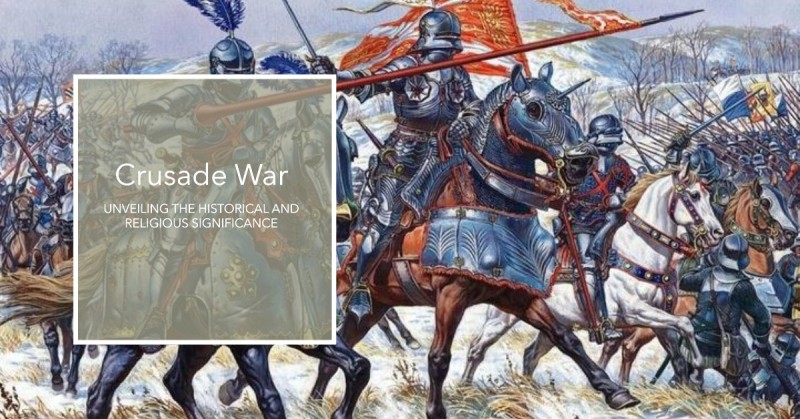
The Crusade war, also known as the Holy War, is a significant event in history that unfolded during the medieval period. It was a series of military campaigns orchestrated by European Christians with the objective of reclaiming the Holy Land from the Muslims. This article delves into the historical context, motivations, key players, and lasting impact of the Crusade war.
1. The Historical Context of the Crusade War
The Crusade war took place primarily between the 11th and 13th centuries, amidst the backdrop of the Middle Ages. This era was characterized by a complex web of political alliances, power struggles, and religious fervor. The Holy Land, including Jerusalem, was under Muslim control, which posed a challenge to the Christian world.
2. Religious Motivations Behind the Crusades
Religion played a pivotal role in fueling the Crusade war. Christian pilgrims faced increasing difficulty in accessing and visiting holy sites in Jerusalem due to Muslim rule. The idea of reclaiming these sacred places became a unifying cause for Christians, invoking a sense of duty and devotion.
3. Pope Urban II and the Call to Arms
In 1095, Pope Urban II delivered a sermon in Clermont, France, calling for a holy expedition to liberate Jerusalem. His impassioned speech stirred the masses, and the First Crusade was born. Pope Urban II's influential role in instigating the Crusades cannot be overstated.
4. The First Crusade: From Peasants to Warriors
The First Crusade witnessed a diverse array of participants, ranging from common peasants to seasoned knights. They embarked on a treacherous journey, facing immense challenges and hardships along the way. Despite initial setbacks, the crusaders managed to capture Jerusalem in 1099, establishing the first Crusader State.
5. The Siege of Jerusalem and the Establishment of Crusader States
The siege of Jerusalem during the First Crusade marked a turning point in the conflict. The city was captured after a grueling battle, leading to the establishment of several Crusader States. These states sought to maintain control over the Holy Land and protect the interests of Christendom.
6. The Later Crusades: A Continuing Struggle
Subsequent Crusades followed the First Crusade, with varying degrees of success. The Second Crusade, led by European monarchs, aimed to strengthen the Crusader States but ultimately fell short of its goals. The Third Crusade, involving renowned figures such as Richard the Lionheart and Saladin, gained significant attention but failed to recapture Jerusalem.
7. The Legacy of the Crusades: Cultural and Economic Impact
The Crusades left an indelible mark on both the Western and Islamic worlds. The contact between different cultures sparked an exchange of ideas, trade, and knowledge. The Crusader States introduced advancements in agriculture, architecture, and governance, shaping the future of Europe and the Middle East.
8. Criticisms and Controversies Surrounding the Crusades
While the Crusades were revered by Christians at the time, they have since attracted criticism and controversy. The excessive violence and atrocities committed during the Crusades are often cited as examples of religious intolerance and aggression. These aspects have led to ongoing debates about the ethical implications of the Crusade war.
9. The Influence of the Crusade War on the Islamic World
The Crusades had a profound impact on the Islamic world, shaping its political, social, and cultural fabric. The Muslim response to the Crusades involved mobilization and the rise of powerful leaders, such as Salah ad-Din (Saladin). The memory of the Crusades continues to resonate in the collective consciousness of the Muslim world.
10. Modern Perspectives on the Crusade War
In modern times, the Crusades are subject to diverse interpretations and scholarly discourse. Historians and academics delve into the motivations, consequences, and perceptions of the Crusades from multiple angles. These studies aim to provide a nuanced understanding of this complex historical event.
11. Lessons Learned: Tolerance and Interfaith Dialogue
Reflecting on the Crusades, it becomes evident that they highlight the importance of tolerance and interfaith dialogue. The conflicts that unfolded during the Crusades underscore the dangers of religious fanaticism and the necessity of fostering understanding and respect among different faiths.
12. Conclusion
The Crusade war remains a significant chapter in human history, with its impact reverberating through the centuries. This series of holy expeditions shaped the course of Europe, the Middle East, and interfaith relations. By studying the Crusades, we gain valuable insights into the complexities of religious conflict and the potential for dialogue and reconciliation.
Top 5 Most Affordable 4x4 SUVs in India: Your Ultimate Buying Guide
Types of Planes and Helicopters Used in India: Army, Navy, and Airforce
Andaman and Nicobar Islands: A Journey to Untouched Beauty and Pristine Shores